
Latest News Regarding
Horn of Africa
Somalia: Rule of Law and Independent Judiciary
Somalia: Rule of Law and Independent Judiciary
Source: The Heritage Institute for Policy Studies published in January 2025 a study titled “Rule of Law and Independent Judiciary in Somalia” by Bashir M. Sheikh-Ali.
Somalia’s judiciary has historically been weak and politically influenced, limiting its ability to uphold the rule of law. Somalia’s Provisional Constitution does not resolve this problem.
The author advocates for the creation of strong legal frameworks and institutions, emphasizing that Somalia’s cultural commitment to justice, if properly harnessed, can ignite a transformative legal renaissance in the country.
Sudan War Crimes by Both Sides
Sudan War Crimes by Both Sides
Source The Washington Post published on 18 January 2025 an article titled “Sudan’s Military Recaptured a City. Bodies Soon Filled the Streets” by Katharine Houreld, Hafiz Haroun, and Jonathan Baran.
After the Sudan Armed Forces (SAF) recaptured the city of Wad Madani from the Rapid Support Forces (RSF), there were reports of war crimes by the SAF, demonstrating that the Army engages in some of the same practices as the RSF. In this case, the victims were often migrants from South Sudan who had moved to Wad Madani.
International Crisis Group on Role for Outsiders in Bringing Peace to Sudan
International Crisis Group on Role for Outsiders in Bringing Peace to Sudan
Source: The International Crisis Group published on 21 January 2025 an analysis titled “Sudan’s Calamitous War: Finding a Path Toward Peace.”
This analysis looks at the role of outside countries in ending the catastrophe in Sudan. Outside actors working on a ceasefire may need to think in terms of a post-war government that makes difficult compromises on national and military leadership, as well as decentralized authority, while preserving space for civilian party representation.
Kenya waives visa requirements for Africans, except Somalia and Libya
Kenya waives visa requirements for Africans, except Somalia and Libya

Source: CapitalFM, Wednesday January 22, 2025
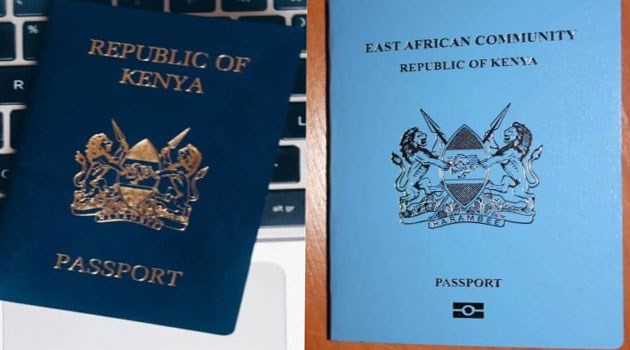
The Kenyan government has announced the removal of eTA and visa requirements for all African nationals, excluding those from Somalia and Libya, citing security concerns.
The move aims to bolster regional integration and promote tourism growth across the continent.
African visitors will now enjoy a two-month stay, while East African Community (EAC) nationals will retain the privilege of a six-month stay under existing free movement protocols.
To streamline the entry process, Kenya will introduce expedited eTA processing, enabling instant approvals with a maximum turnaround time of 72 hours.
Additionally, the adoption of an Advanced Passenger Information/Passenger Name Record system is expected to enhance security and expedite passenger clearance at airports.
The Cabinet has directed the Ministries of National Treasury, Transport, Interior, and Tourism to devise comprehensive guidelines to improve traveler experiences at Kenyan airports within a week.
Ethiopia: Tigray’s forgotten internally displaced people
Ethiopia: Tigray’s forgotten internally displaced people

Source: DW, Tuesday January 21, 2025
The war between Ethiopia’s government forces and Tigrayan fighters killed hundreds of thousands of people and displaced millions. Many now grapple with severe social and economic challenges despite a peace agreement.
Internally displaced people in Tigray have no clue when they will return to their homesImage: Million Haileselassie Brhane/DW
There was relief in Tigray when the war ended with a peace agreement signed in Pretoria, South Africa, in November 2022. But, despite the cessation of hostilities, hundreds of thousands of people uprooted from their homes during the conflict continue to live in dire conditions. The war in Tigray was fought between Ethiopia’s National Defense Force, backed by troops from Eritrea, against fighters of the Tigray People’s Liberation Front (TPLF).
Birhane Tafere, 62, fled from his home in Humera, a city in northwestern Ethiopia, in November 2020. Since then, Birhane has spent over four years in an IDP camp. He now resides in a temporary shelter in Abiye Adi, located 100 kilometers (60 miles) from Mekelle, the capital of Tigray, along with thousands of other displaced people, and describes his life as miserable.
“All displaced people are in despair. We are worried about what will happen next,” Birhane told DW.
“The authorities who should be returning us to our villages have abandoned our agenda and are busy struggling for power.”
1 million refugees
According to Tigray’s interim regional administration, nearly 1 million displaced people have not been able to return to their homes.
The administration cites significant social and economic hardship caused by this displacement, as militants continue to control western Tigray and Eritrean forces control border areas, hindering safe returns. For many, the situation in Tigray is life-threatening.
Negasi Marek, a displaced father of four from western Tigray, has been living in Tsehaye Primary School, which now serves as a temporary IDP camp in Shire city. Negasi told DW that the conditions are so severe in the shleter that people are dying.
“Four people have died alone in the last two weeks, just because of the dire situation,” Negasi said.
“We are not living; we are suffering. Especially the elderly, diabetics and people with hypertension do not get medicine and food. All you can expect here is death,” Negasi added.
People ‘suffering immensely’
The opposition party Salsay Weyane Tigray accuses both the regional and federal governments of causing the suffering of the displaced people. Party Chairman Alula Hailu told DW that the Eritrean army has not yet withdrawn from the border areas of Irob and Badme or other districts of Tigray.
Alula said neither Tigray’s regional administration nor Ethiopia’s federal government had fulfilled their responsibilities. As a result, many displaced people continue to live in tents.
“About 600 of the 10,625 displaced people from Badme alone have died due to a lack of food and other support,” Alula said, adding that his party has repeatedly called attention to the plight of displaced people.
“Similarly, displaced people in Shire are suffering immensely. The problem is widespread,” Alula said.
Billions still needed
Tigray’s regional interim administration has announced plans to facilitate the return of displaced people. However, the plan is estimated to require $2.1 billion (€2 billion) and the political will to return the displaced people.
The administration has reportedly engaged UN agencies and other stakeholders to secure funding and support for the process.
Despite repeated government promises to return the internally displaced people, there has been no sign of change.
Edited by: Chrispin Mwakideu
Ruto sets goal to make Kenya sugar exporter by 2027
Ruto sets goal to make Kenya sugar exporter by 2027

Source: by FELIX KIPKEMOI
Tuesday January 21, 2025

President William Ruto in Kakamega on January 20, 2025/PCS
President William Ruto has announced plans to transform the country into a major sugar exporter by 2027.
Speaking in Kakamega Monday, Ruto emphasised the country’s ongoing strategies implemented to revitalise the industry, which he said has long faced challenges, including production gaps.He pointed out that the writing off of Sh117 billion in debts, including the payment of Sh1.7 billion in farmers’ arrears and Sh650 million owed to employees, was part of the efforts to revive the sector.
These efforts, he noted, are beginning to show promising fruits.
“With a record 832,000 metric tons of sugar produced last year, Kenya is on course to attain surplus production and commence regional exports by 2027, turning sugarcane cultivation into a viable and rewarding venture,” he said.
The Head of State made the remarks during the launch of the issuance of Sh150 million bonus payment for sugarcane farmers at the Mumias Sugar Company Limited.
The payment will see sugar farmers who have supplied cane to Mumias Sugar factory benefit.
The historic bonus payment to farmers, Ruto stated, not only validates the success of the reforms introduced in the sugar sector but is also evidence of the potential to uplift farmers and support tens of thousands of livelihoods.
He added that in line with other measures outlined in the 2019 Sugar Taskforce, he had assented to the Sugar Act 2024, which establishes sugarcane catchment areas to better manage supply, synchronise milling operations, and improve efficiency.
“We have asked the new Cabinet Secretary for Agriculture, Mutahi Kagwe, who is here with us today, to finalise regulations to operationalise the Sugar Act to provide clarity and get rid of cartels in the sector,” he said.
The President also pointed out that the government is also distributing subsidised fertiliser to enhance productivity and increase farmers’ income.
He said the bonus payment would have a substantial impact on the growth of the sugar sector, which is a key target for Kenya’s export plans.
“To support this, 50 per cent of the annual rent paid to the bank will be distributed as a bonus to farmers on a pro-rata basis, depending on the quantity of sugarcane each farmer supplies to the miller,” President Ruto explained.
The President said this will ensure fairness and transparency, and will be adjusted appropriately on the basis of the company’s performance.
He pointed out that the model can be replicated in other publicly-owned sugar companies once they are leased, and the board will conduct a comprehensive study to develop a robust system of giving incentives to farmers.
“Additionally, Cane testing units will be utilised to ensure farmers receive additional payments based on the quality of their cane along with the payments based on weight,” he said.
The President asked Kagwe to increase subsidised fertiliser for sugarcane farmers from 700,000 bags last year to one million bags this year.
He said it was encouraging that farmers who supply cane to Mumias Sugar Company are being paid within seven days.
He further instructed the CS to work with the Sugar Research Board to have a particular fertiliser for sugarcane in a bid to increase production.
Agriculture Principal Secretary Paul Ronoh was also present.
Others are Deputy President Kithure Kindiki among a host of leaders from the region.
Ruto urges regional unity to tackle terror threats, strengthen security
Ruto urges regional unity to tackle terror threats, strengthen security
Resource: By Salmah Namwanje
Monday January 20, 2025
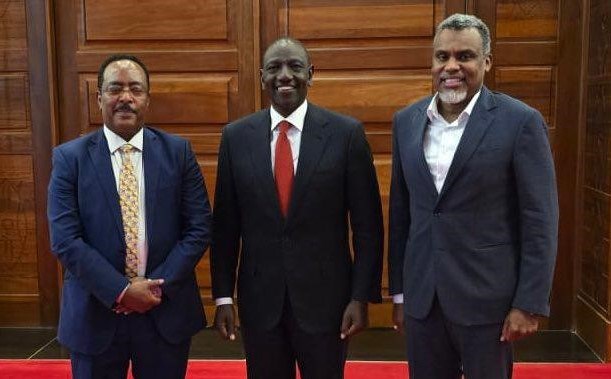
President William Ruto has called for enhanced collaboration among countries in the Horn of Africa to address security challenges such as terrorism and organized crime.
Speaking after a meeting with Ethiopia’s Director General of the National Intelligence Security Service, Ambassador Redwan Hussien, at State House, Nairobi, Ruto emphasized Kenya’s commitment to working with regional and global partners to bring stability to the East African Community (EAC) and beyond.
“Security challenges such as terrorism and organized crime require collaborative efforts among countries in the Horn of Africa. Kenya undertakes to work with partners across the globe to ensure peace and stability,” Ruto stated on his X account.
The Somalia-based Al-Shabaab militant group remains a significant threat to peace and stability in the region. Its cross-border attacks on Kenya and Uganda have caused widespread devastation and insecurity.
In Kenya, Al-Shabaab’s attacks include the Westgate Mall attack (2013), which left 67 people dead, and the Garissa University attack (2015), where 148 students were killed.
The group continues to target Kenya’s northeastern region, disrupting education, trade, and local governance.
In Uganda, the group’s most notable attack was the 2010 Kampala bombings, which killed 74 people. More recently, Al-Shabaab has carried out raids near the Ugandan border, threatening regional stability.
These attacks highlight the urgent need for coordinated counter-terrorism efforts to protect civilians and infrastructure across East Africa.
Kenya has been at the forefront of combating terrorism, both within its borders and as part of the African Union Transition Mission in Somalia (ATMIS).
The country has deployed troops to Somalia, strengthened its border security, and enhanced surveillance in northeastern counties.
During his meeting with Ambassador Hussien, President Ruto discussed strategies to strengthen intelligence-sharing and counter-terrorism measures with Ethiopia, a key ally in regional security.
Ethiopia’s proximity to Somalia and its strategic role in the Horn of Africa make it a critical partner in combating Al-Shabaab and other extremist groups.
President Ruto underscored the need for a unified regional strategy to address security challenges including enhanced intelligence-sharing among EAC member states, joint training programs for security personnel and economic development initiatives to address the root causes of terrorism, such as poverty and unemployment.
In addition, Kenya has committed to working with international partners to strengthen global counter-terrorism efforts.
The country’s focus on regional collaboration aligns with its broader foreign policy agenda of promoting peace and stability in Africa.
The meeting at State House highlights Kenya’s proactive approach to tackling insecurity and fostering unity in the Horn of Africa.
As President Ruto emphasized, “Peace is non-negotiable. We owe it to our people to create a secure environment where they can thrive.”
With growing regional partnerships and a shared vision for stability, East Africa is poised to make significant strides in overcoming the threat of terrorism and ensuring lasting peace for its citizens.
Somaliland’s President Irro vows to enhance ties with Ethiopia and Djibouti
Somaliland’s President Irro vows to enhance ties with Ethiopia and Djibouti

Source: Monday January 20, 2025
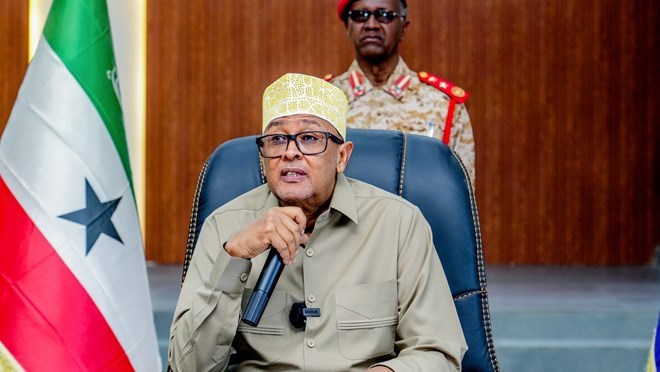
Hargeisa (HOL) – Somaliland President Abdirahman Mohamed Abdullahi Irro has pledged to strengthen ties with Ethiopia and Djibouti to improve Somaliland’s economic development, security, and regional cooperation.
President Irro praised Ethiopia as a vital neighbor and long-time ally at a Sunday Hargeisa event. “Ethiopia is a long-standing friend and an indispensable partner in economic development, security, and fostering our relationships within Africa,” Irro said. “It is crucial for us to enhance this relationship and its mutual benefits.”
President Irro also addressed the strained relations between Somaliland and Djibouti, which have been embroiled in a year-long dispute. He emphasized his administration’s commitment to rebuilding ties with Djibouti and advancing cooperation with the United States.
“We will strengthen our relations with Djibouti and the United States, two nations that have demonstrated significant interest in Somaliland,” he added.
A year ago, Somaliland and Ethiopia signed a memorandum of understanding (MoU) granting Ethiopia a military base in the Gulf of Aden in exchange for Ethiopia’s formal recognition of Somaliland. However, the agreement was abandoned after Somalia and its international partners applied diplomatic pressure on Ethiopia. Subsequent negotiations in Ankara, Turkey, successfully resolved the year-long dispute, leading to the agreement’s cancellation.
IMF’s board approves second review of Ethiopia’s $3.4 billion program
IMF’s board approves second review of Ethiopia’s $3.4 billion program

Source: Reuters, Saturday January 18, 2025

A general view of the cityscape of Addis Ababa, Ethiopia, April 24, 2024. REUTERS/Tiksa Negeri/File Photo Purchase Licensing Rights
The executive board of the International Monetary Fund on Friday approved the second review of Ethiopia’s current financing program, the fund said, paving the way for a disbursement of about $250 million.
The East African nation struck the four-year, $3.4 billion program deal last July, after it undertook far-reaching reforms including the floatation of its birr currency, to enable it to try to put its debt restructuring back on track.
“The authorities continue their efforts to restore debt sustainability and are taking steps to secure a debt treatment. The progress made on debt restructuring negotiations under the Common Framework is welcome,” the IMF said in a statement.
“The financing assurances received, and adjustment efforts made are consistent with IMF policy requirements and program parameters.”
The Fund’s staff and the government reached agreement on the second review in late November.
The IMF has assessed that Ethiopia’s economy has fared better than expected under the reform program, with projected surge in inflationary pressure failing to materialise and hard currency reserves rising faster than the envisaged rate.
After unusually fast reviews of Ethiopia’s programme that were aimed at closely monitoring the impact of the reforms, the IMF said in November it would switch to the conventional six-month review schedule.
The IMF’s role in Ethiopia’s debt overhaul has come under criticism from some quarters, including from World Bank staff, who questioned the conclusions reached by the Fund’s debt sustainability assessment in an internal document last year.
Reporting by Duncan Miriri and Jasper Ward; Editing by Leslie Adler and Daniel Wallis
US Declares Sudan’s Rapid Support Forces Guilty of Genocide
US Declares Sudan’s Rapid Support Forces Guilty of Genocide
Source: The Hill published on 7 January 2025 an article titled “US Determines Sudan Paramilitary Committed Genocide, Sanctions Leader” by Laura Kelly.
In a last-minute policy decision, Secretary of State Antony Blinken declared that the Rapid Support Forces (RSF) and allied militias committed genocide in Sudan. Blinken added this decision neither supports nor favors the Sudan Armed Forces (SAF). Both the RSF and SAF bear responsibility for the violence and suffering in Sudan.
Sudan Demands Urgent Global Action
Sudan Demands Urgent Global Action
Source: The Hill published on 13 January 2025 an article titled “Sudan’s Descent into Chaos Demands Urgent Global Action” by Imran Khalid.
The situation in Sudan is dire as the world continues to focus on crises such as Gaza and Ukraine. Sudan’s path to stability hinges on its people, the engagement of regional powers, and the international community to craft a political solution that ends the chaos.
Somalia waxay leedahay sadex hay’adood oo kumeel-gaar ah oo aan shacabka Somaliyeed dooran:
Somalia waxay leedahay sadex hay’adood oo kumeel-gaar ah oo aan shacabka somaliyeed dooran:
- Labada aqal ee barlamaanka oo kumeelgaar ah
- Maxkamada sare oo kumeelgaar ah
- Xukuumad kumeelgaar ah
Go’aamada/heshiisyada masiiriga ah oo ay xukuumadu qaadato waxaa qasab ku ah in labada aqal baarmaanka la horgeeyo si ay u ansixiyaan ama ay udiidaan.
Ethiopia announces plan to expand electric vehicle charging infrastructure
Ethiopia announces plan to expand electric vehicle charging infrastructure

Source: Xinhuanet, Tuesday January 14, 2025
The Ethiopian government has unveiled plans to expand the country’s electric vehicle (EV) charging infrastructure, aiming to install charging stations every 50 to 120 km, according to an official from the Petroleum and Energy Authority of Ethiopia.
Exhibitors display electric vehicles at the Ethio-Green Mobility 2024 exhibition in Addis Ababa, capital of Ethiopia, Nov. 25, 2024. (Xinhua/Michael Tewelde)
The Ethiopian government has unveiled plans to expand the country’s electric vehicle (EV) charging infrastructure, aiming to install charging stations every 50 to 120 km, according to an official from the Petroleum and Energy Authority of Ethiopia.
A directive outlining the regulatory framework for EV charging systems has been approved, Bahru Oljra, executive director of energy sector control at the authority, told the state-affiliated Fana Broadcasting Corporation on Friday.
Oljra noted that the directive addresses licensing for charging stations, service tariffs, power supply standards, and security measures. He said that EV charging options remain limited, with most owners relying on home-based charging or privately-run charging stations.
Ethiopia has seen a surge in EV adoption, necessitating a robust charging network to support long-distance travel and reduce range anxiety for EV owners.
According to the Ethiopian Ministry of Transport and Logistics, over 100,000 EVs are currently on the road, and the government aims to increase this number to 500,000 within the next decade, replacing 95 percent of fuel-powered vehicles.
To accelerate the shift to electric mobility, the Ethiopian government imposed a ban on the import of gasoline and diesel vehicles early last year amid a global surge in fuel prices
Magnitude-5.5 earthquake strikes Ethiopia region: GFZ
Magnitude-5.5 earthquake strikes Ethiopia region: GFZ
13 January 2025 – 09:41By Reuters
 Just R20 for the first month.Support independent journalism by subscribing to our Source: Timeslive, digital news package.
Just R20 for the first month.Support independent journalism by subscribing to our Source: Timeslive, digital news package.
An earthquake of magnitude 5.5 struck Ethiopia, east of the capital Addis Ababa, early on Saturday, the German Research Centre for Geosciences said. File photo.
Image: 123RF/vchalup
An earthquake of magnitude 5.5 struck Ethiopia, east of the capital Addis Ababa, early on Saturday, the German Research Centre for Geosciences (GFZ) said.
The quake was shallow, at a depth of 10km, GFZ said.
The area has been shaken by a multitude of minor quakes since a nearby volcano began showing signs of imminent eruption at the start of the year.
Somalia, Egypt commit to strengthening bilateral ties and regional security
Somalia, Egypt commit to strengthening bilateral ties and regional security

Source: Hiiraan Online, Monday January 13, 2025
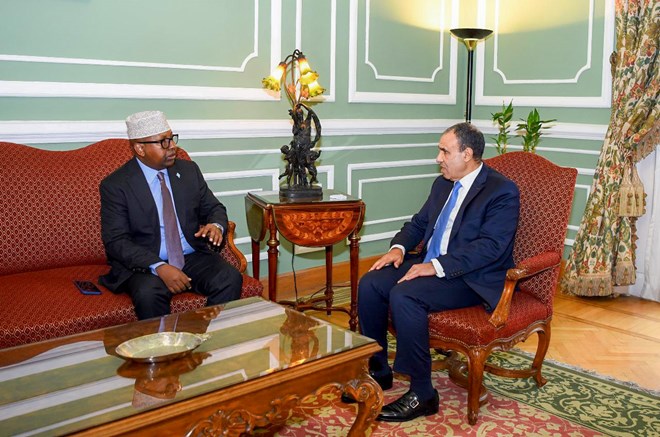
Mogadishu (HOL) – Somalia’s Foreign Minister, Ambassador Ahmed Moallim Fiqi, met with Dr. Badr Abdel Atty, Egypt’s Minister of Foreign Affairs, to discuss enhancing regional stability and deepening cooperation between the two nations.
The meeting in Cairo focused on activating the African Union’s AUSSOM mission and supporting the Somali National Army’s (SNA) efforts to combat terrorism. Both ministers praised the ongoing visit of Somalia’s Minister of Defense to Egypt, highlighting it as a positive step toward stronger collaboration.
Dr. Abdel Atty reaffirmed Egypt’s unwavering support for Somalia’s unity, sovereignty, and stability. He emphasized the importance of joint efforts to deepen bilateral relations and pledged continued technical assistance to bolster Somalia’s development and security initiatives.
The two ministers agreed to enhance cooperation through the Joint Ministerial Committee and to implement key outcomes from the 2024 Egypt-Somalia-Eritrea summit. These initiatives aim to promote security and stability in the Horn of Africa and the Red Sea region, addressing shared challenges and fostering regional integration.
Somaliland police arrest two sons for murdering their mother in Togdheer
Somaliland police arrest two sons for murdering their mother in Togdheer

Source: Hiiraan online, Monday January 13, 2025

Somaliland Police spokesperson addressing the media following the arrest of two men accused of murdering their mother in the Togdheer region last month. SUPPLIED
Hargeisa (HOL) — Police in Somaliland arrested two men on Saturday, accused of killing their mother in the Habaaslay area of the Togdheer region on December 23, 2024.
The victim, Aamina Yusuf Ismail, was reportedly murdered by her two sons, who later buried her. The authorities in Togdheer launched a swift investigation, and the suspects were apprehended.
“We deployed officers to investigate the crime, and we arrested the two sons of Aamina Yusuf Ismail,” a police spokesperson said. “During the investigation, it was revealed that she was struck with seven blows.”
One of the suspects reportedly confessed to the crime, telling authorities: “I was the first to strike, and I was the last to end her life.”
The murder has left the community in shock. The crime went unreported in the days following the incident, as the victim was buried shortly after her death. It wasn’t until later that the details of the crime were revealed, intensifying the community’s disbelief and raising questions about the motives behind the act.
The case continues to unfold, with local authorities working to gather more information as the investigation progresses.
Somali lawmakers warn against acquisition of public land in Mogadishu
Somali lawmakers warn against acquisition of public land in Mogadishu

Source: Hiiraan Online, Sunday January 12, 2025
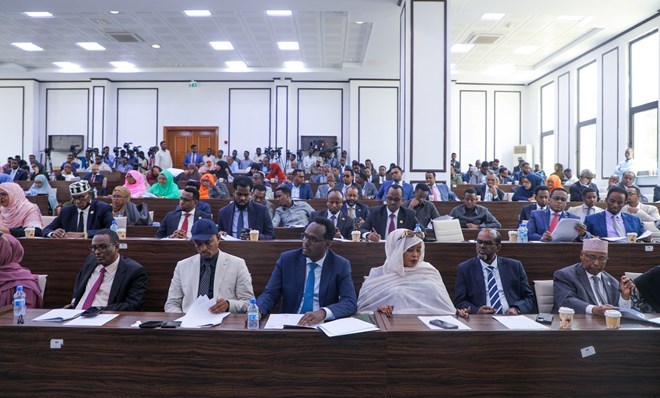
Mogadishu (HOL) – A group of 97 members from both chambers of Somalia’s federal parliament has warned businesspeople and individuals about acquiring public land in Mogadishu, accusing federal government leaders of auctioning off these lands for personal gain.
In a joint statement released on Saturday, the lawmakers condemned what they described as the misappropriation of public property by Villa Somalia, the office of the presidency.
“We, the Members of Parliament of both Houses of the Somali Parliament, fulfilling our constitutional duties, hereby submit that we stand for the protection of public property and warn those who facilitate Villa Somalia’s theft of public land,” the statement declared.
The warning marks the second time the lawmakers have voiced opposition to the alleged sale of public land. They accused President Hassan Sheikh Mohamud of auctioning significant parcels of land previously designated for educational purposes.
“The President, who comes from the education community, has auctioned off land where many Somalis studied, including the National University, the Ilays School, and others. He seems indifferent to the plight of Somali youth,” the statement added.
The allegations follow a similar warning last week from former President Sharif Sheikh Ahmed, former Prime Minister Hassan Ali Kheyre, and Member of Parliament Abdirahman Abdishakur Warsame. They accused the federal government of distributing public land to private families, auctioning it to businesspeople, or using it as political bribes.
Despite growing criticism, the federal government has yet to respond to these allegations.
Somalia and Ethiopia agree to restore full diplomatic relations
Somalia and Ethiopia agree to restore full diplomatic relations

Source: Hiiraan Online, Sunday January 12, 2025
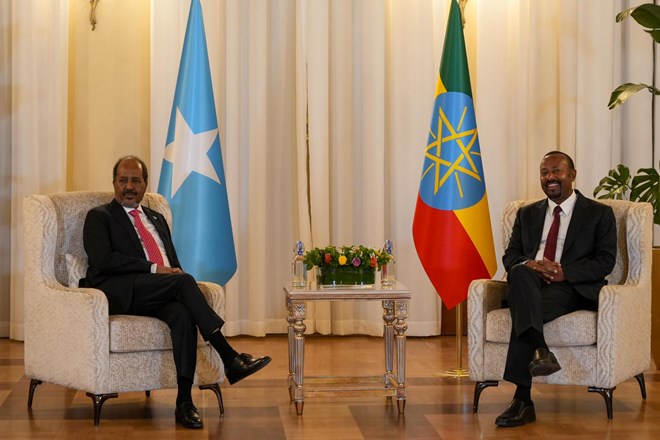
Addis Ababa (HOL) – Somali President Hassan Sheikh Mohamud and Ethiopian Prime Minister Abiy Ahmed have agreed to restore and enhance bilateral relations, including full diplomatic representation in their respective capitals, during a high-level meeting in Addis Ababa on Saturday.
The two leaders emphasized the importance of strengthening cooperation between their diplomatic missions in multilateral and regional forums to address shared interests. They highlighted that regional stability depends on robust collaboration founded on mutual trust, confidence, and respect.
The two neighbouring leaders also emphasized strengthening security collaboration as the region faces evolving threats from extremist militant groups; the leaders instructed their respective security agencies to coordinate more closely to promote peace and stability.
President Mohamud and Prime Minister Abiy also underscored the importance of increasing trade, investment, and economic cooperation. They agreed to expand infrastructure linkages to facilitate trade and foster shared prosperity between the neighboring countries.
The meeting comes amid efforts to ease tensions that erupted in January 2024 when Ethiopia signed a controversial memorandum of understanding (MoU) with Somaliland, Somalia’s breakaway region. The agreement allowed Ethiopia to lease a stretch of Somaliland’s coastline for a naval base and commercial port in exchange for possible recognition of Somaliland’s independence.
Somalia criticized the MoU, threatened to expel Ethiopian peacekeepers and strengthened ties with Ethiopia’s regional adversaries, including Egypt and Eritrea.
One year later, Somalia and Ethiopia reached a preliminary agreement during talks in Turkey on December 11, 2024. Both nations committed to resolving the dispute through technical negotiations, which are scheduled to begin by the end of February.
President Mohamud’s visit to Ethiopia followed his participation in an African agriculture summit in Uganda earlier on Saturday. His office confirmed the trip in a statement shared on the X social media platform.
Egypt opposes military presence of non-Red Sea nations in the region
Egypt opposes military presence of non-Red Sea nations in the region

Source: HiiraSaturday January 11, 2025
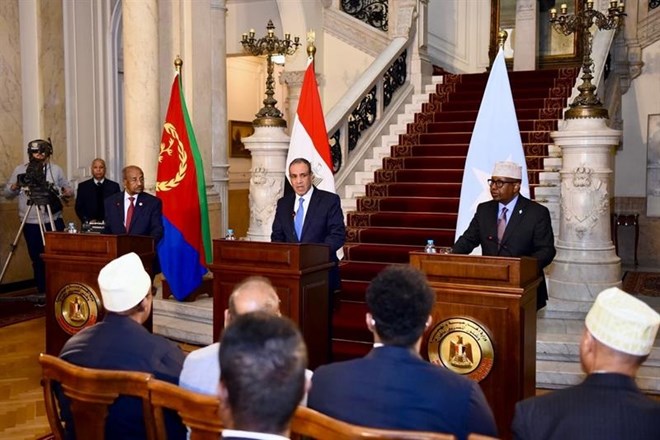
Egyptian Foreign Minister Badr Abdelatty addresses the media during a press conference in Cairo, alongside Eritrean Foreign Minister Osman Saleh and Somali Foreign Minister Ahmed Moalim Fiqi. Photo: Egyptian Foreign MinistryMogadishu (HOL) — Egypt will not tolerate any military or naval presence in the Red Sea from non-littoral states—countries that do not border the sea—Foreign Minister Badr Abdelatty declared during a press conference in Cairo on Saturday. His statement came alongside Eritrean Foreign Minister Osman Saleh and Somali Foreign Minister Ahmed Moalim Fiqi following the first meeting of a trilateral ministerial committee to foster cooperation.
The trio emphasized their commitment to diplomatic coordination, with plans to hold regular ministerial meetings. The next meeting will be held in Mogadishu, while a trilateral summit at the presidential level is also in the works. The collaboration marks a major step in Egypt’s efforts to extend its influence in the Horn of Africa, where it has long sought to maintain dominance over the Red Sea, a vital waterway for global trade and its national security.
During the press conference, Abdelatty reaffirmed Egypt’s support for Somalia’s sovereignty, emphasizing their shared stance against actions that threaten Somalia’s territorial integrity. “We reaffirm our commitment to Somalia’s stability, security, and territorial integrity,” Abdelatty said. Discussions also focused on enhancing Somalia’s institutional capacity to address security challenges, including protecting its land and maritime borders.
The ministers also reiterated their shared vision on the outcomes of the Asmara Summit held in October 2024. The summit brought together leaders from Egypt, Eritrea, and Somalia to discuss regional issues.
Somalia, Eritrea, and Egypt united in opposition to Ethiopia’s controversial port deal with the breakaway region of Somaliland. Ethiopia’s bid to gain access to the Red Sea through Somaliland fueled tensions with Somalia, which views the agreement as a violation of its sovereignty. In response, Somalia moved to strengthen its diplomatic and military ties with Egypt and Eritrea. This new strategic alliance seeks to counterbalance Ethiopia’s increasing regional influence.
On December 11, 2024, Turkish President Recep Tayyip Erdoğan brokered an accord between Somali President Hassan Sheikh Mohamud and Ethiopian Prime Minister Abiy Ahmed. The agreement effectively nullifies Ethiopia’s controversial Memorandum of Understanding (MoU) with Somaliland, reaffirming Somalia’s territorial integrity and sovereignty.
Somali President Mohamud travelled to Ethiopia on Saturday to restore bilateral relations and discuss the implementation of the accord.
The resolution of this dispute has broader implications for regional stability. Egypt, which had previously expressed concerns over Ethiopia’s maritime ambitions, is closely monitoring the situation. President Abdel Fattah al-Sisi has indicated that Egypt is “closely following” the developments, emphasizing the importance of the agreement aligning with international law and contributing to lasting security and stability in the Horn of Africa.
As tensions flare over Ethiopia’s Red Sea ambitions, Somalia has turned to Egypt for support, enhancing its military cooperation and seeking Egypt’s participation in the new African Union Support and Stabilization Mission in Somalia (AUSSOM), a peacekeeping force intended to combat the Al-Qaeda-linked Al Shabab insurgency. Egypt is reportedly requesting a “lead” role in the new mission. Analysts see any contribution as part of Egypt’s broader strategy to bolster its presence and curb Ethiopia’s expanding regional power, particularly concerning access to strategic waterways like the Red Sea.
Egypt’s growing footprint in Somalia is a strategic maneuver to counter Ethiopia’s influence in the Horn of Africa. The development is intricately linked to the longstanding tensions over the Grand Ethiopian Renaissance Dam (GERD), a hydroelectric project on the Blue Nile River that Ethiopia views as vital for its economic development. Egypt, however, has expressed concerns that the dam could disrupt the flow of the Nile, upon which it depends for approximately 85% of its water supply.
Impact of Red Sea Crisis on Chinese Investment in Djibouti
Impact of Red Sea Crisis on Chinese Investment in Djibouti
Source: The South China Morning Post published on 28 December 2024 an article titled “China’s Faith in Djibouti Is Paying Off, But Could Red Sea Crisis Muddy the Waters?” by Enoch Wong.
The article notes that Chinese investments in Djibouti are generally profitable, but continuing Yemen-based Houth attacks on Red Sea shipping raise questions concerning the future of trade through Djibouti. A Houthi-created crisis that continues for an extended period of time could have negative consequences for Chinese investments in the region.
